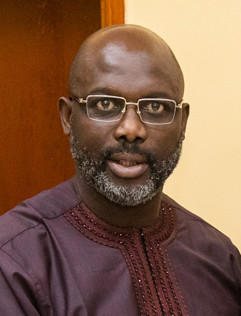 George Manneh Oppong Weah; born 1 October 1966, is a Liberian politician and former professional footballer currently serving as the 25th President of Liberia, in office since 2018. Prior to his election to presidency, Weah served as Senator from Montserrado County. During his football career, he played as a striker. His prolific 18-year professional playing career ended in 2003.[5] He is the first former professional footballer to become head of state.
George Manneh Oppong Weah; born 1 October 1966, is a Liberian politician and former professional footballer currently serving as the 25th President of Liberia, in office since 2018. Prior to his election to presidency, Weah served as Senator from Montserrado County. During his football career, he played as a striker. His prolific 18-year professional playing career ended in 2003.[5] He is the first former professional footballer to become head of state.
The government of Liberia, modeled on the government of the United States, is a unitary constitutional republic and representative democracy as established by the Constitution. The government has three co-equal branches of government: executive, headed by the president; legislative, consisting of the bicameral Legislature of Liberia; and judicial, made up of the Supreme Court and several lower courts.
The president serves as head of government, head of state and the commander-in-chief of the Armed Forces of Liberia.[1] Among the other duties of the president are to sign or veto legislative bills, grant pardons, and appoint Cabinet members, judges and other public officials. Together with the vice president, the president is elected to a six-year term by majority vote in a two-round system and can serve up to two terms in office.
The Legislature is composed of the Senate and the House of Representatives. The House, led by a speaker, has 73 members apportioned among the 15 counties on the basis of the national census, with each county receiving a minimum of two members. Each House member represents an electoral district within a county as drawn by the National Elections Commission and is elected by a plurality of the popular vote of their district in to a six-year term. The Senate is made up of two senators from each county for a total of 30 senators. Senators serve nine-year terms and are elected at-large by a plurality of the popular vote . The vice president serves as the President of the Senate, with a President pro tempore serving in his absence.
Liberia's highest judicial authority is the Supreme Court, made up of five members and headed by the Chief Justice of Liberia. Members are nominated to the court by the president and are confirmed by the Senate, serving until the age of 70. The judiciary is further divided into circuit and speciality courts, magistrate courts and justices of the peace. The judicial system follows the Anglo-American common law. An informal system of traditional courts still exists within the rural areas of the country, with trial by ordeal remaining common despite being officially outlawed.
Between 1877 and 1980, the government was dominated by the True Whig Party. Today, over 20 political parties are registered in the country, based largely around personalities and ethnic groups. Most parties suffer from poor organizational capacity. The 2005 elections marked the first time that the president's party did not gain a majority of seats in the Legislature.
